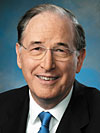Rockefeller wants D Block reallocation included in deficit-reduction legislation

With Congress focused on deficit reduction, a key senator is advocating that legislation that would reallocate the 700 MHz D Block to public safety and largely fund the deployment of a nationwide LTE network for first responders be part of a bill designed to help address the nation’s budget woes.
Senate Commerce Committee Chairman Jay Rockefeller (D-W.Va.) is co-sponsor of S.911, bipartisan legislation that is co-sponsored by committee ranking member Kay Bailey Hutchison (R-Texas) and was approved by the committee in a convincing 21-4 vote last month. The bill has not been scored by the Congressional Budget Office and has not been scheduled for a vote by the full Senate.
Rockefeller reportedly would like the language in the bill — including D Block reallocation and $12 billion in funding to pay for the LTE network buildout — to be integrated into deficit-reduction legislation, because S.911 calls for $10 billion in future auction proceeds to be earmarked for the U.S. Treasury for deficit reduction, according to news reports.
Beltway sources indicate that is unclear whether integrating S.911 language is politically feasible, but the effort could be the best way to have the much-debated first-responder network approved before the 10th anniversary of the 9/11 attacks, which is just two months away.
“The reason to attach it is because they pretty much know that [deficit-reduction] bill has got to move,” said Sean Kirkendall, spokesman for the Association of Public-Safety Communications Officials (APCO).
Without being attached to deficit-reduction legislation, some Beltway sources question whether S.911 will be approved before the 9/11 anniversary. Most believe Senate passage is possible before the end of the month, but a D Block bill has not been scheduled for committee consideration yet. Meanwhile, with Congress scheduled to be on recess for most of August, there would be only a few days to approve such legislation in September — a difficult task under any circumstances, but one that would be especially tough while lawmakers are focused on deficit matters.
Kirkendall expressed optimism about the prospects of legislation in the Senate and noted that the Obama administration has been outspoken in its support for a nationwide public-safety LTE network.
However, most public-safety representatives have acknowledged that D Block legislation will face much tougher opposition in the House, where many members are focused primarily on curbing federal-government spending, not initiating a new multibillion program.
“We need to get the Senate support formalized [with a floor vote], but the focus really is on the House Energy and Commerce [Committee],” Kirkendall said, noting that the Public Safety Alliance is planning another visit to Capitol Hill later this month to raise awareness among lawmakers about the issue.

















